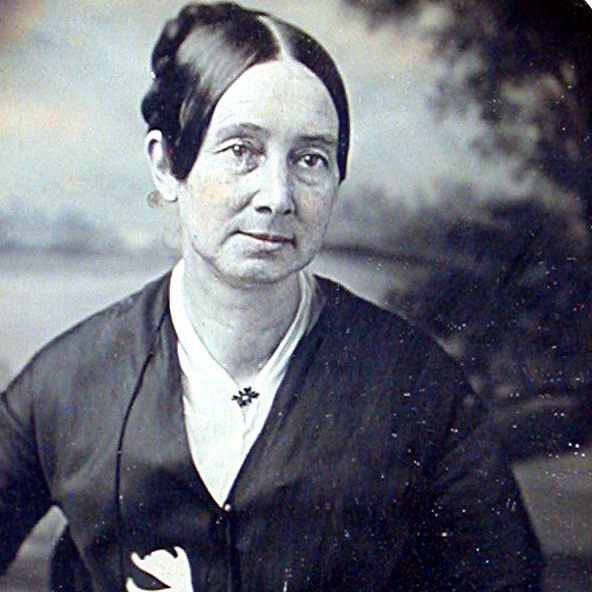- Surname:
- Dix
- First name:
- Dorothea Lynde
- Era:
- 19th century
- Field of expertise:
- Social work
Politics - Place of birth:
- Hampden (USA)
- * 04.04.1802
- † 18.07.1887

Dix, Dorothea Lynde
American social reformer and lobbyist.
Dorothea Dix (1802-1887) was born to a Methodist preacher in Hampden, Maine. She left her parental home at age 12 and took up teaching at the age of 14. Three years later, she founded a girls’ school (Dix Mansion) in Boston, Massachusetts. In 1841, while working as a Sunday school teacher, she visited the department for mentally disturbed inmates at East Cambridge Jail. Dix was appalled at the conditions under which the inmates were being held. She deemed this treatment not only cruel but also deeply inhumane. The sight of all the men and women put in chains was a turning point in her life: following her Christian ideals, she decided to advocate for the improvement of those people’s living conditions on the basis of Christian ideals.Between 1840 and 1854, she toured the United States and visited nearly all prisons and workhouses.
Lobbying for the inmates of prisons and asylums
Dix informed the authorities about the conditions she encountered (Memorial to the Legislature of Massachusetts, 1843) and strongly urged for improvement. Thereupon, over the following years, several therapeutically oriented asylums were founded in the United States and Canada, and already existing institutions were upgraded. Dix’s work brought an end to long-term institutionalization for many of the individuals affected. In 1848, she proposed a bill to grant state-owned land as a public endowment for the benefit of the mentally ill and disabled. Although approved by Congress, the bill was vetoed by President Franklin Pierce and thus not adopted. Dix extended her mission to Europe and later, during the American Civil War, she organized medical care for wounded soldiers. Towards the end of her life, she took up residence at a hospital she had founded herself in Trenton, New Jersey, and died there unmarried in 1887.
Dorothea Dix’s lifelong commitment for the sake of the inmates of mental asylums and her contributions to the development of therapeutic institutions in the 19th century provide a prominent and also typical example for the historical function and the political leeway of individual charity and lobby work in the American healthcare and social services system.
Literature
Davidson, L., J. Rakfeldt, J. Strauss (2010): The advocacy of Dorothea Six; The legacy of Dorothea Dix. In: L. Davidson, J. Rakfeldt, J. Strauss: The Roots of the Recovery Movement in Psychiatry: Lessons Learned. Chichester: Wiley-Blackwell, pp. 61-65.
Dix, D. L. (1828): Conversations on Common Things. Third edition. Boston: Munroe & Francis.
Dix, D. L. (1843): Memorial to the Legislature of Massachusetts. Boston: Munroe & Francis.
Dix, D. L. (1850): Fifth Letter to Convicts in State Prisons and Houses of Correction, or County Penitentiaries. Printed but not published, November, 1850.
Brown, T. (1998): Dorothea Dix. New England Reformer. Cambridge: Harvard University.
Gollaher, D. (1995): Voice for the Mad. The Life of Dorothea Dix. New York: Free Press.
Tiffany, F. (1890): The Life of Dorothea Lynde Dix. Boston: Houghton & Mifflin.
Robin Pape, Burkhart Brückner
Photo: Samuel Broadbent (The Boston Antathaeum) / Source: Wikimedia / [public domain].
Referencing format
Robin Pape, Burkhart Brückner (2015):
Dix, Dorothea Lynde.
In: Biographisches Archiv der Psychiatrie.
URL:
biapsy.de/index.php/en/9-biographien-a-z/77-dix-dorothea-lynde-e
(retrieved on:22.09.2025)
